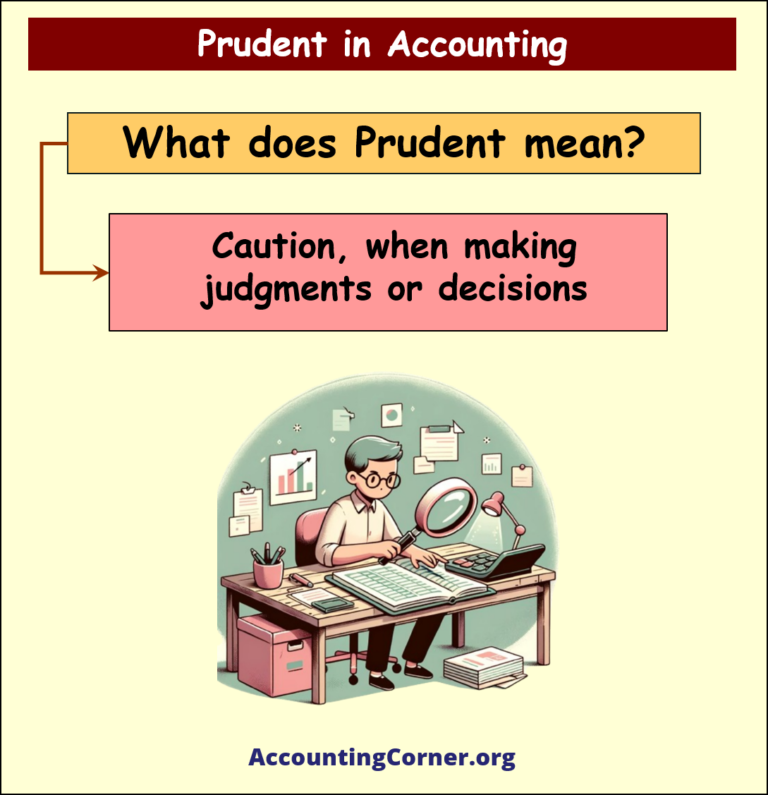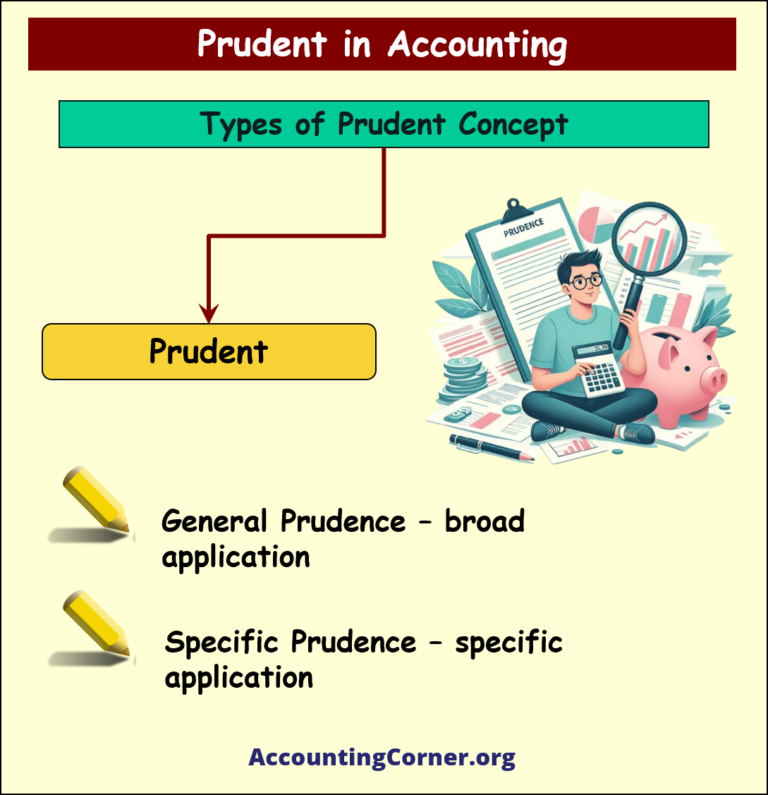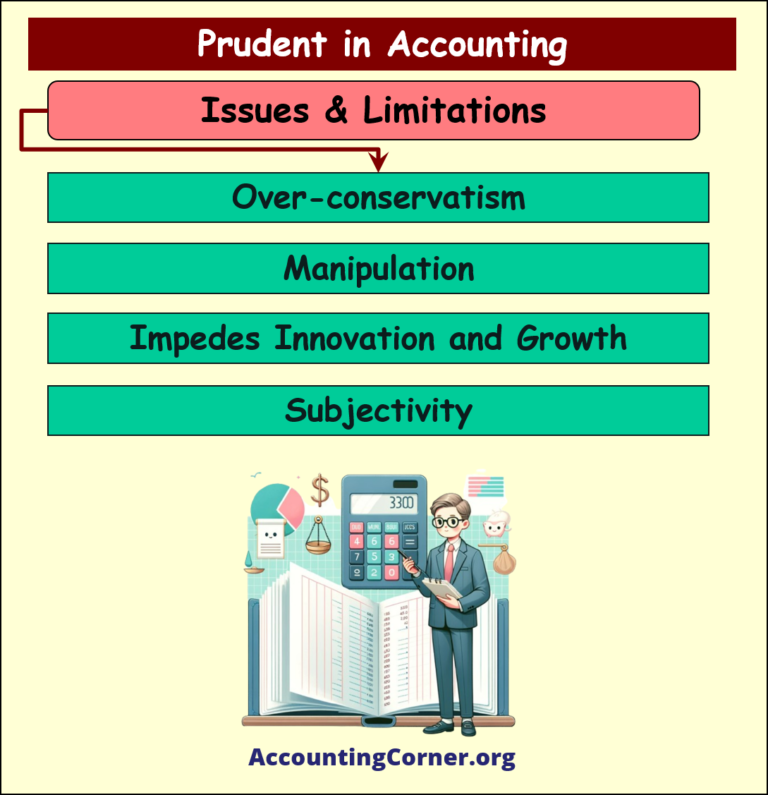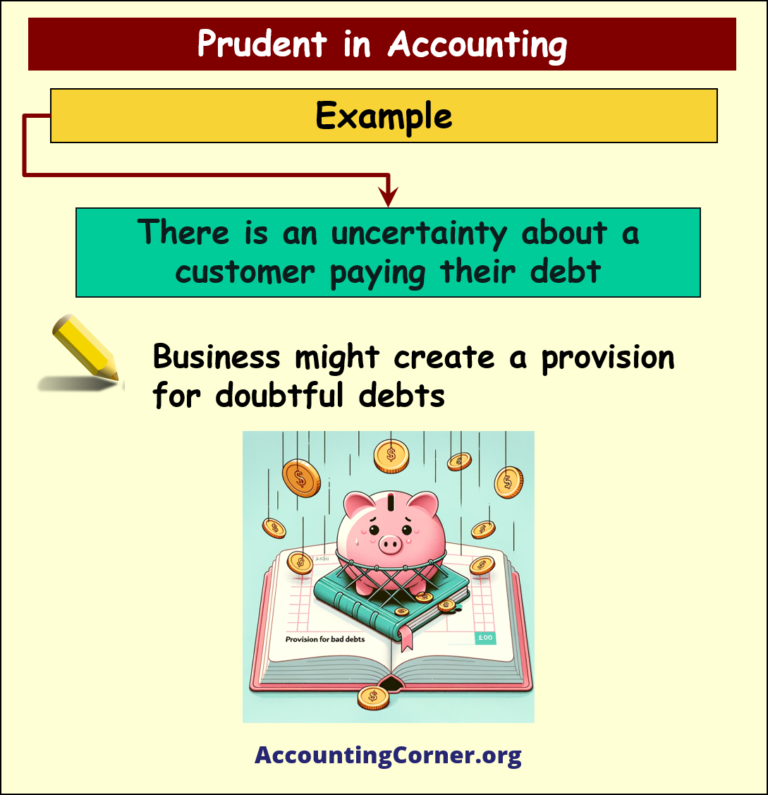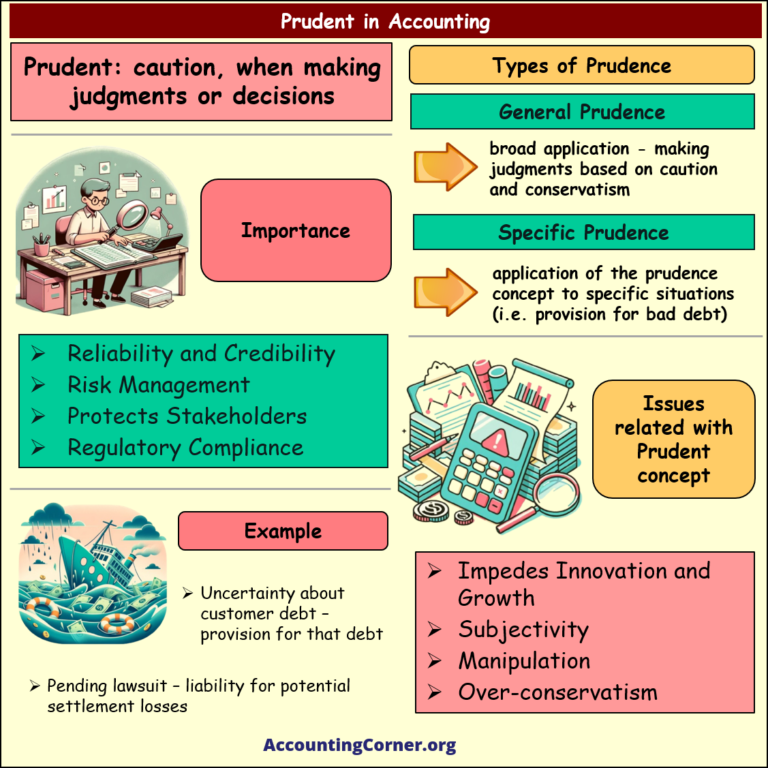Prudent Definition
So what does prudent mean?
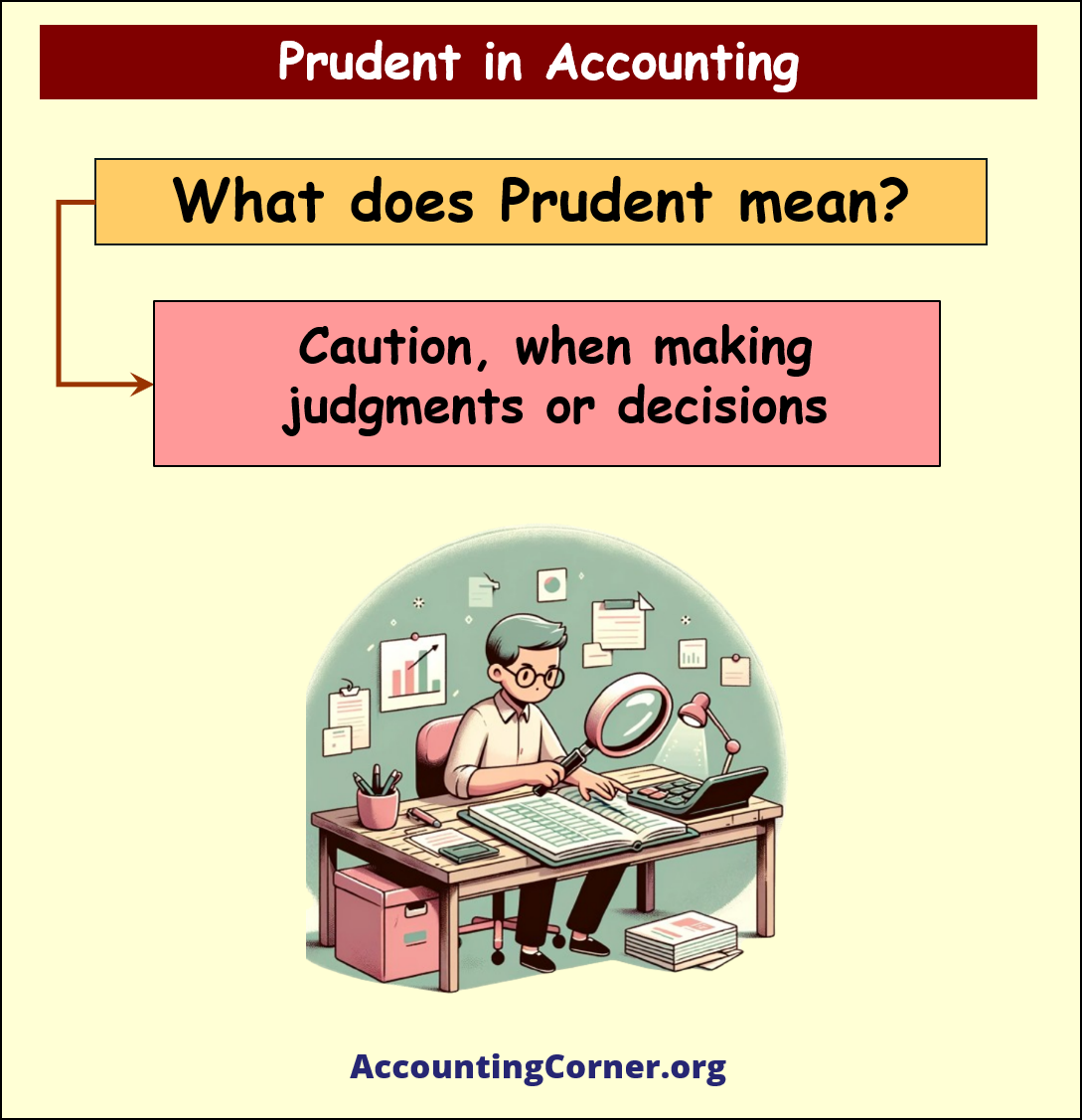
![]() Prudent concept in accounting and finance refers to the exercise of caution, when making judgments or decisions. This concept is grounded in ensuring, that:
Prudent concept in accounting and finance refers to the exercise of caution, when making judgments or decisions. This concept is grounded in ensuring, that:
-
-
- assets and income are not overstated, and
- liabilities and expenses are not understated
-
![]() Prudent concept, when we defint prudent meaning, is one of the fundamental principles that underpin financial reporting and decision-making.
Prudent concept, when we defint prudent meaning, is one of the fundamental principles that underpin financial reporting and decision-making.
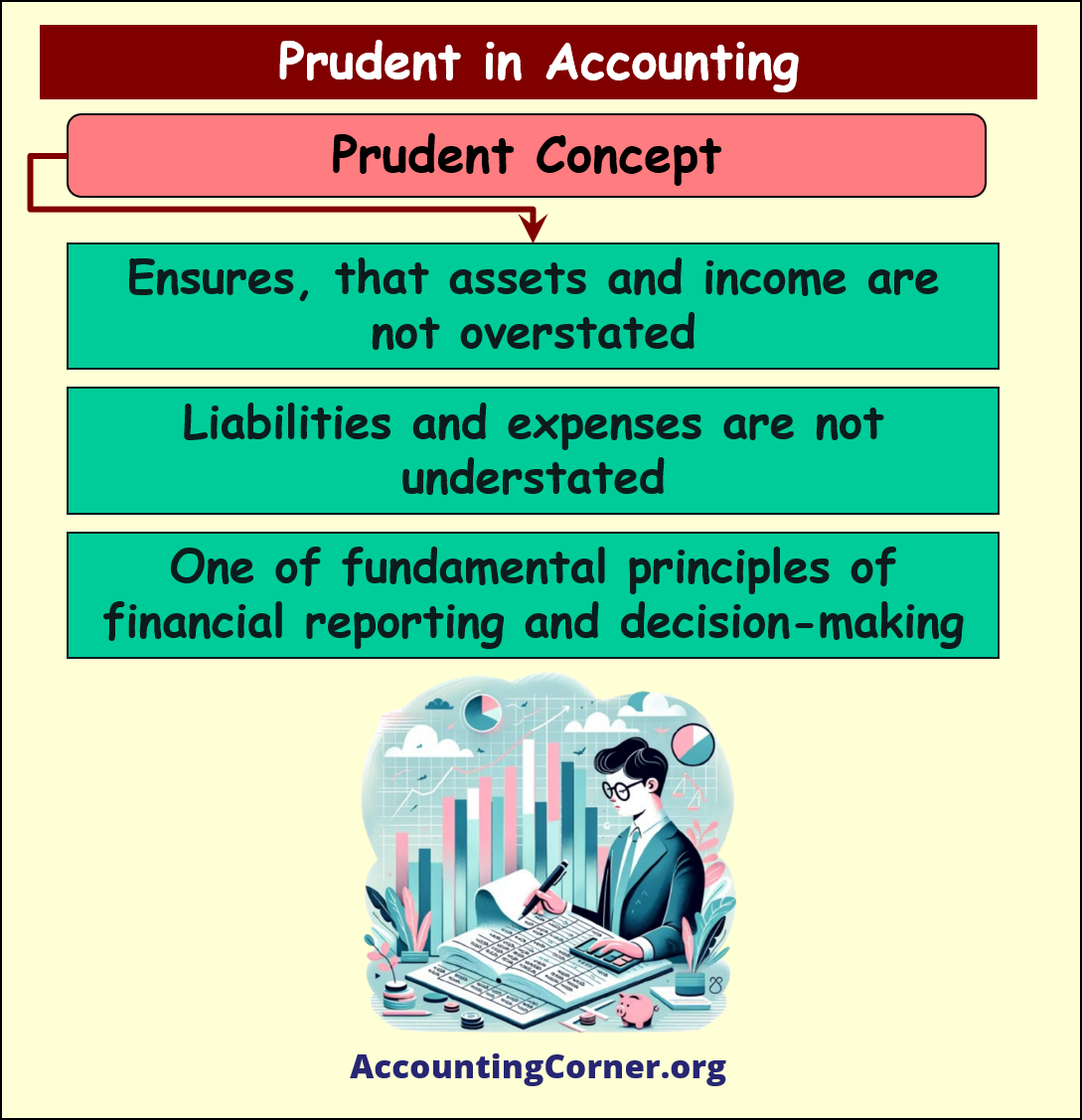
Importance of Prudent Concept:
- Reliability and Credibility: Prudence ensures that financial statements give a true and fair view of a company’s financial position, making them reliable and credible for stakeholders
- Risk Management: Being prudent helps businesses anticipate potential losses and avoid overly optimistic assumptions
- Protects Stakeholders: Ensures that stakeholders such as shareholders, creditors, and others are not misled by over-optimistic financial statements
- Regulatory Compliance: Many accounting standards and regulations require the application of the prudence principle
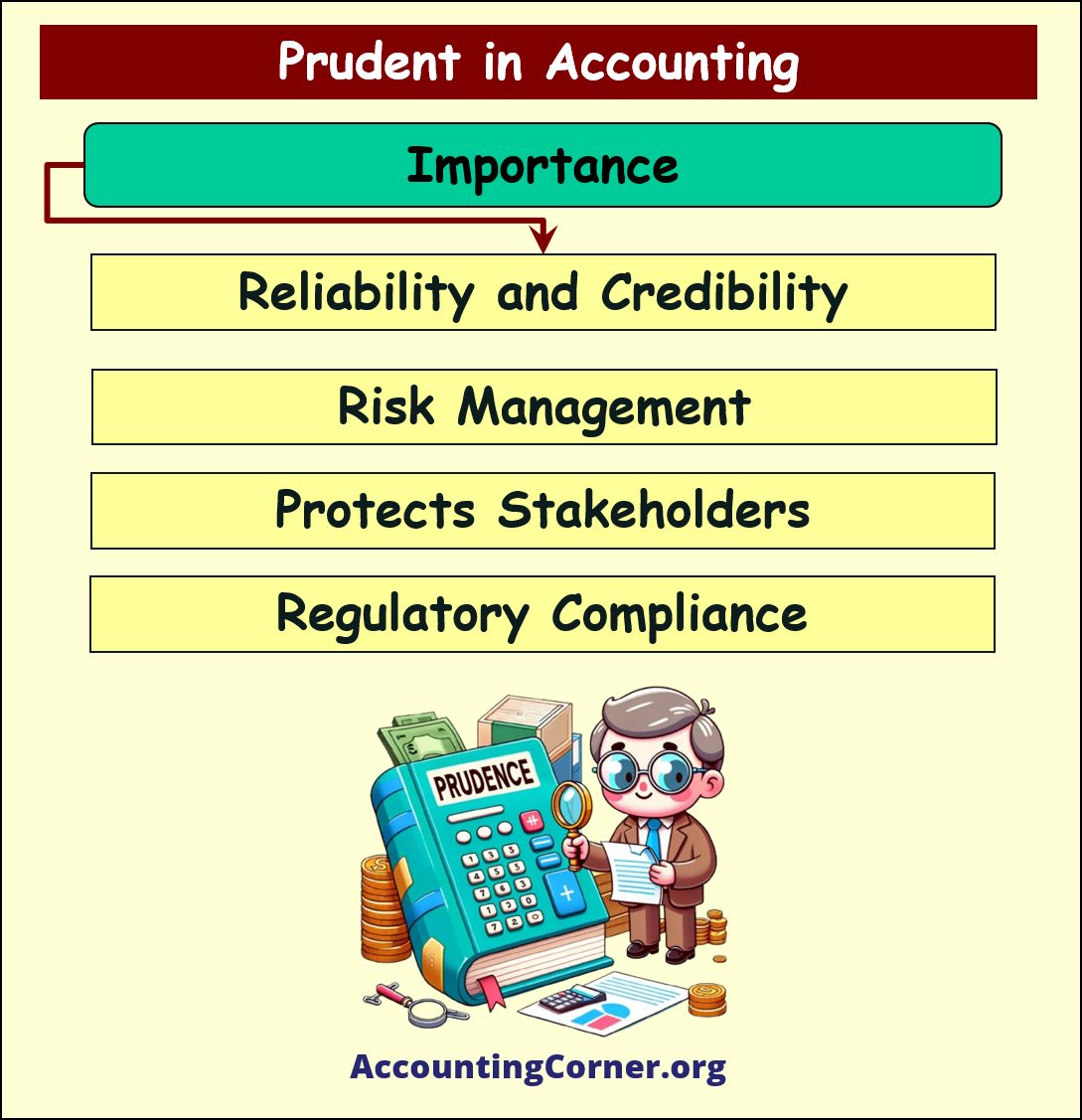
Types of Prudent Concept
- General Prudence: This is a broad application of the concept, where accountants and financial professionals make judgments based on caution and conservatism.
- Specific Prudence: This is the application of the prudence concept to specific situations, like creating provisions for doubtful debts or recognizing potential liabilities.
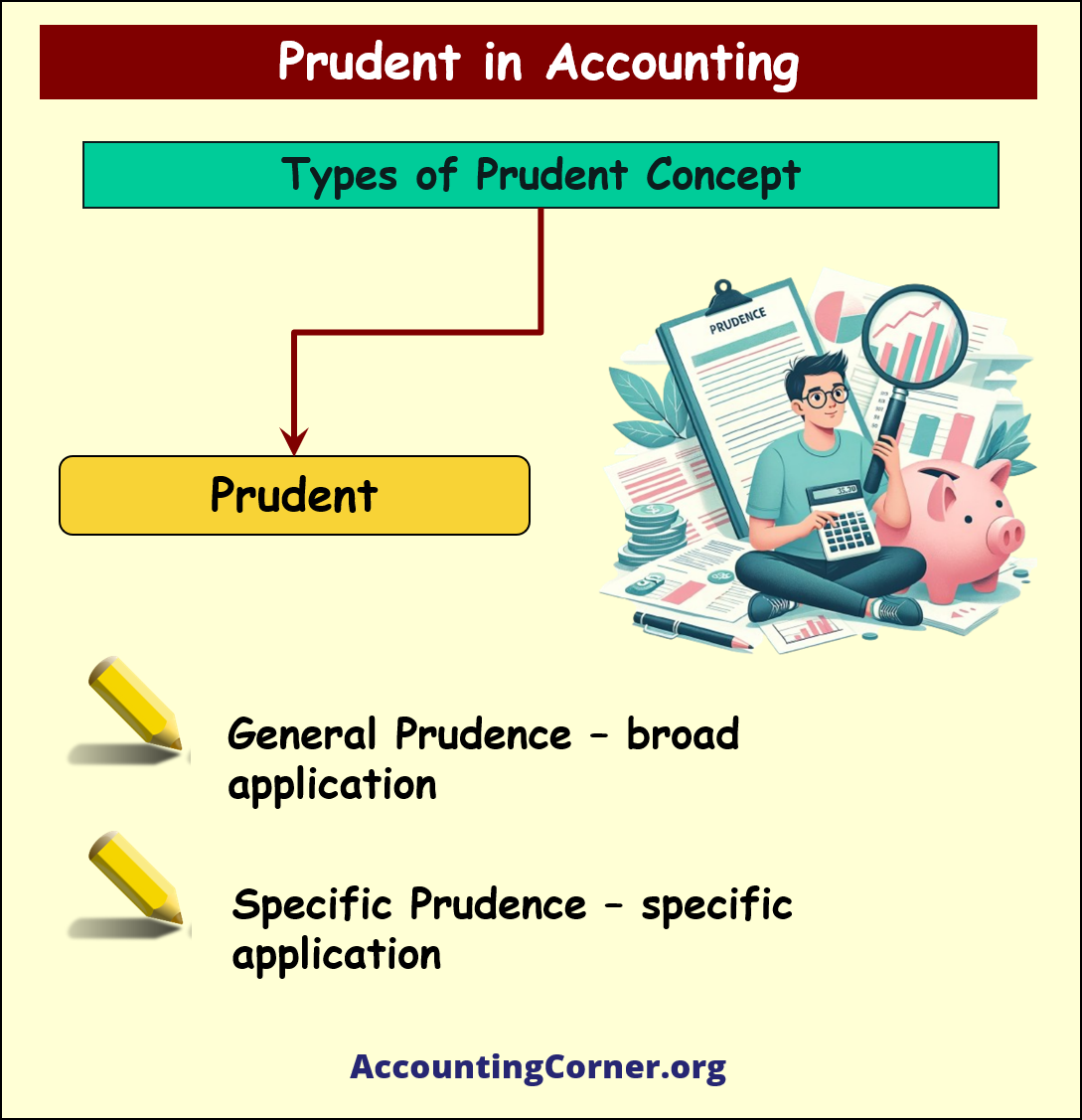
Formula on Prudent Concept
![]() There’s no specific “formula” for prudence. However, its application often involves estimations and provisions. For instance, when calculating the provision for doubtful debts:
There’s no specific “formula” for prudence. However, its application often involves estimations and provisions. For instance, when calculating the provision for doubtful debts:
Provision for Doubtful Debts = Total Receivables * Estimated % of Bad Debts
Examples of Prudent Concept Aplication
- If there is uncertainty about a customer paying their debt, a company might create a provision for doubtful debts
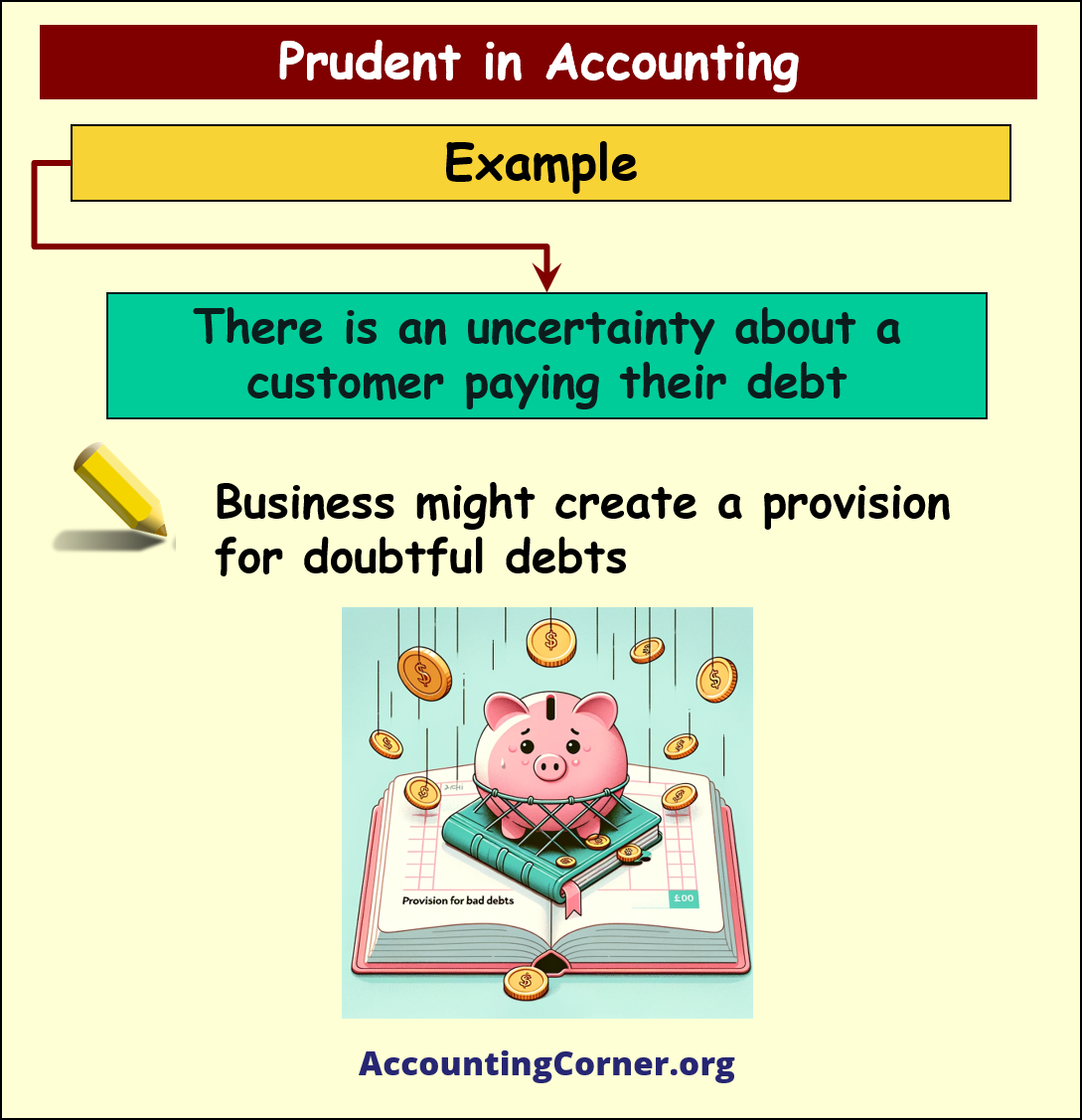
- If a lawsuit is pending against a company, and there’s a probability that the company might lose, the company may recognize a liability for the potential legal settlement
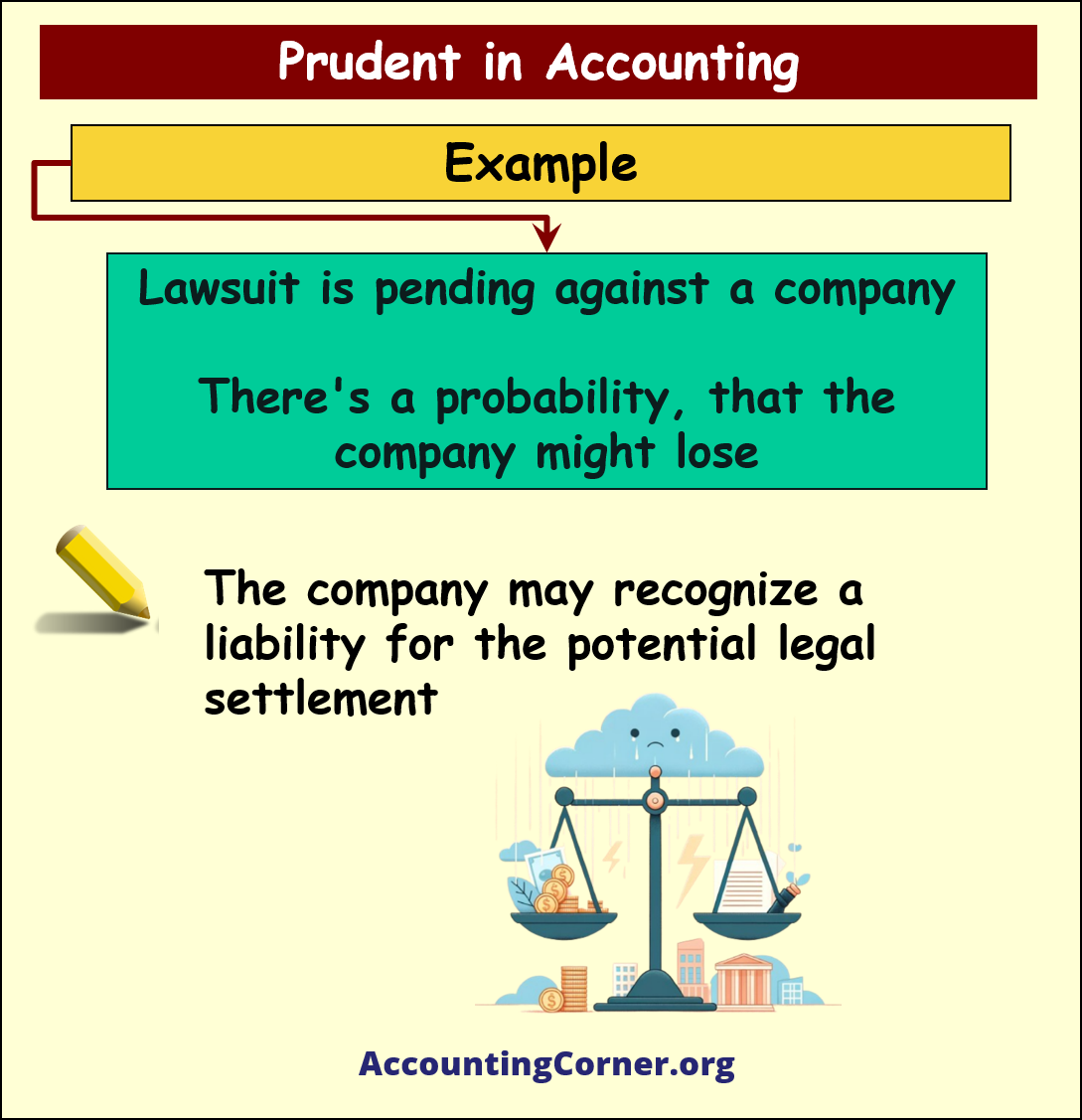
- When valuing inventory, companies might use the lower of cost or net realizable value, reflecting a prudent view of the asset’s value
Issues and Limitations of the Concept of Prudent
- Over-conservatism: Excessive prudence can lead to significant under-reporting of assets or income, which might not give a true and fair view of the financial position
- Manipulation: Prudence can sometimes be used to manipulate earnings, for instance by changing provisions or deferring income
- Impedes Innovation and Growth: Excessive caution might prevent companies from taking calculated risks that could lead to growth and innovation
- Subjectivity: The degree of prudence applied can vary among accountants, leading to inconsistencies
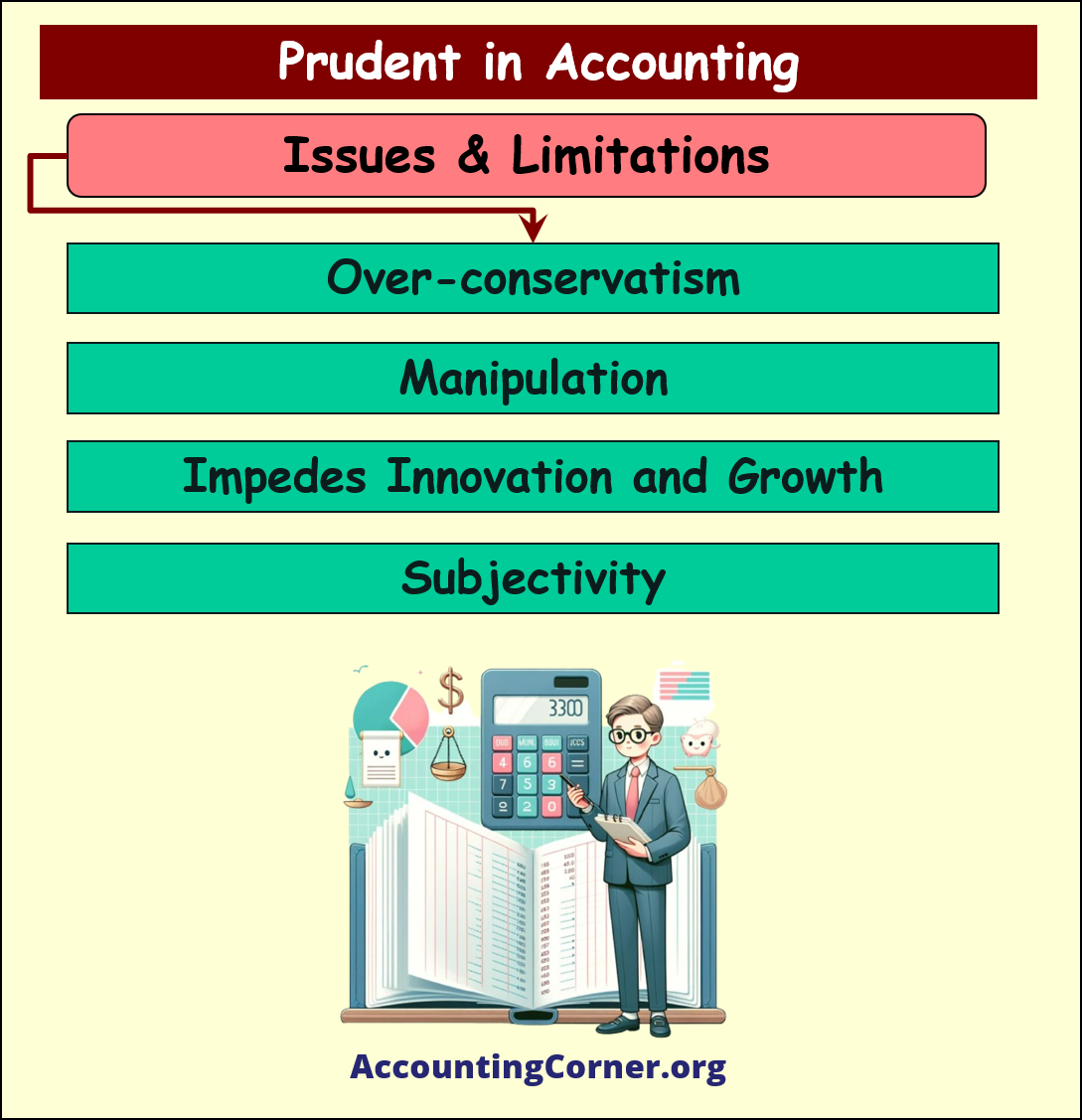
Prudent Definition – What does Prudent Mean? – Visuals
Prudent Definition – What does Prudent Mean? – Video
The Most Popular Accounting & Finance Topics:
- Balance Sheet
- Balance Sheet Example
- Classified Balance Sheet
- Balance Sheet Template
- Income Statement
- Income Statement Example
- Multi Step Income Statement
- Income Statement Format
- Common Size Income Statement
- Income Statement Template
- Cash Flow Statement
- Cash Flow Statement Example
- Cash Flow Statement Template
- Discounted Cash Flow
- Free Cash Flow
- Accounting Equation
- Accounting Cycle
- Accounting Principles
- Retained Earnings Statement
- Retained Earnings
- Retained Earnings Formula
- Financial Analysis
- Current Ratio Formula
- Acid Test Ratio Formula
- Cash Ratio Formula
- Debt to Income Ratio
- Debt to Equity Ratio
- Debt Ratio
- Asset Turnover Ratio
- Inventory Turnover Ratio
- Mortgage Calculator
- Mortgage Rates
- Reverse Mortgage
- Mortgage Amortization Calculator
- Gross Revenue
- Semi Monthly Meaning
- Financial Statements
- Petty Cash
- General Ledger
- Allocation Definition
- Accounts Receivable
- Impairment
- Going Concern
- Trial Balance
- Accounts Payable
- Pro Forma Meaning
- FIFO
- LIFO
- Cost of Goods Sold
- How to void a check?
- Voided Check
- Depreciation
- Face Value
- Contribution Margin Ratio
- YTD Meaning
- Accrual Accounting
- What is Gross Income?
- Net Income
- What is accounting?
- Quick Ratio
- What is an invoice?
- Prudent Definition
- Prudence Definition
- Double Entry Accounting
- Gross Profit
- Gross Profit Formula
- What is an asset?
- Gross Margin Formula
- Gross Margin
- Disbursement
- Reconciliation Definition
- Deferred Revenue
- Leverage Ratio
- Collateral Definition
- Work in Progress
- EBIT Meaning
- FOB Meaning
- Return on Assets – ROA Formula
- Marginal Cost Formula
- Marginal Revenue Formula
- Proceeds
- In Transit Meaning
- Inherent Definition
- FOB Shipping Point
- WACC Formula
- What is a Guarantor?
- Tangible Meaning
- Profit and Loss Statement Template
- Revenue Vs Profit
- FTE Meaning
- Cash Book
- Accrued Income
- Bearer Bonds
- Credit Note Meaning
- EBITA meaning
- Fictitious Assets
- Preference Shares
- Wear and Tear Meaning
- Cancelled Cheque
- Cost Sheet Format
- Provision Definition
- EBITDA Meaning
- Covenant Definition
- FICA Meaning
- Ledger Definition
- Allowance for Doubtful Accounts
- T Account / T Accounts
- Contra Account
- NOPAT Formula
- Monetary Value
- Salvage Value
- Times Interest Earned Ratio
- Intermediate Accounting
- Mortgage Rate Chart
- Opportunity Cost
- Total Asset Turnover
- Sunk Cost
- Housing Interest Rates Chart
- Additional Paid In Capital
- Obsolescence
- What is Revenue?
- What Does Per Diem Mean?
- Unearned Revenue
- Accrued Expenses
- Earnings Per Share
- Consignee
- Accumulated Depreciation
- Leashold Improvements
- Operating Margin
- Notes Payable
- Current Assets
- Liabilities
- Controller Job Description
- Define Leverage
- Journal Entry
- Productivity Definition
- Capital Expenditures
- Check Register
- What is Liquidity?
- Variable Cost
- Variable Expenses
- Cash Receipts
- Gross Profit Ratio
- Net Sales
- Return on Sales
- Fixed Expenses
- Straight Line Depreciation
- Working Capital Ratio
- Fixed Cost
- Contingent Liabilities
- Marketable Securities
- Remittance Advice
- Extrapolation Definition
- Gross Sales
- Days Sales Oustanding
- Residual Value
- Accrued Interest
- Fixed Charge Coverage Ratio
- Prime Cost
- Perpetual Inventory System
- Vouching
Return from Prudent Meaning to AccountingCorner.org
